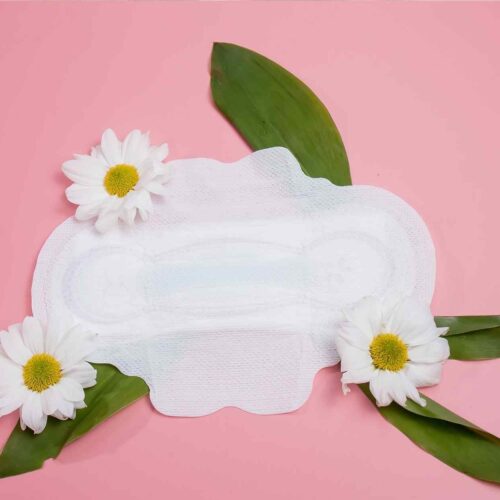As parents, watching our little ones go through the painful teething process can be a heart-wrenching experience – it is tough on your sweet baby, too!
The pain and discomfort associated with teething can make babies feel fussy, restless, and uncomfortable, which in turn can make parents feel helpless and overwhelmed making it a challenging time for both you and your babe.
While there are several over-the-counter options available, many parents prefer to seek out natural remedies for their baby’s teething pain before turning to medication.
Skip ahead to our list of natural remedies for baby teething by clicking here.

Just a heads up, this page may contain Amazon, Etsy, and other affiliate links. We may make a small commission from any clicks at no expense to you. Head over to our disclosure policy for more information.
In this post, we will explore some natural teething remedies for babies that have been tried and tested by parents over generations and may help provide relief for your teething baby during this challenging time.
From herbal remedies to frozen treats, there are plenty of baby teething relief ideas to help soothe your little one’s teething pain. These teething remedies are not only safe and gentle on your baby’s gums but also simple and easy to prepare at home.
So let’s dive in and discover some natural teething relief ideas that can help soothe your baby’s discomfort and make the teething process a little easier for both you and your little one.
When does a baby start teething?
Have you recently wondered, is my baby teething? Or, when do baby teeth come in? In general, the teething process can start as early as three months and continue until around 36 months when the last set of molars typically comes in.
[Related post: Our Favorite Montessori Toys for Babies]
How long does teething last?
The duration of teething pain can vary from one baby to another because every baby is a unique little human! The actual duration of teething pain can vary based on the timing and order of teeth eruption and the individual baby’s pain tolerance. Typically, the most intense teething pain occurs during the first few teeth, and the pain tends to subside as the baby gets used to the sensation of teeth pushing through the gums.
Generally, teething pain can last anywhere from a few days to several weeks, but it’s essential to keep in mind that every baby is different, and their teething pain timeline may vary from other babies their age.
How to know if baby is teething
There are quite a few standard teething symptoms to look out for. But remember, every baby is unique! Some babies may show all of these signs of baby teething, and others might show none. If you’re ever concerned or unsure about your baby’s symptoms, always talk with your pediatrician to rule out any other possible underlying issues or causes.
- Drooling: Teething babies tend to produce more saliva, leading to excessive drooling.
- Biting: Babies may bite or chew on toys, fingers, or other objects to help relieve the pressure on their gums.
- Irritability: Teething can be painful and uncomfortable, causing babies to become more irritable than usual.
- Difficulty sleeping: Teething can disrupt your baby’s sleep patterns, leading to restless nights and difficulty falling asleep.
- Swollen or sensitive gums: Your baby’s gums may appear red, swollen, and sensitive to the touch.
- Changes in appetite: Some babies may experience a decrease in appetite or refuse to eat altogether due to the discomfort of teething.
Baby Teething Chart

Natural Teething Remedies for Babies
Remember, every baby is different, and what works for one may not work for another. It’s important to try different remedies and find what works best for your baby. If your baby is experiencing severe teething pain or you have any concerns about their teething symptoms or any potential side effects of natural remedies, it’s always best to talk with your baby’s pediatrician.
- Cold Items: Applying something cold to the baby’s gums can help numb the pain and reduce inflammation. You can give the baby a cold teething ring, a frozen washcloth, or a chilled spoon to munch. This also adds some counterpressure which is great for easing their teething pain!
- Gum Massage: Gently massaging the baby’s gums with your clean finger can also help soothe teething pain. Make sure to wash your hands thoroughly before doing this.
- Chamomile Tea: Chamomile has natural anti-inflammatory properties and can help calm the baby. You can make chamomile tea and let it cool before giving very small amounts to the baby in a bottle or sippy cup. (Always consult your pediatrician before giving any sort of herbal medicine to your baby if you have any concerns.)
- Clove Oil: Clove oil has natural numbing properties and can help reduce teething pain. Dilute a drop of clove oil with a carrier oil like coconut oil and apply it to the baby’s gums.
- Breastmilk Popsicles: If you are breastfeeding, you can freeze your breast milk in a popsicle mold and give it to the baby to chew on. This can help numb the gums and provide some relief.
- Ginger Root: Ginger has natural anti-inflammatory properties that can help reduce teething pain. Cut a small piece of ginger root and allow your baby to chew on it. Always closely monitor your baby when they are eating and be aware of the signs of choking.
- Essential Oils: Some essential oils, such as lavender and peppermint, have natural calming and soothing properties that can help ease teething discomfort. Dilute a few drops of essential oil with a carrier oil and apply it to the baby’s gums or use a diffuser to disperse the scent in the air. Be sure to choose a high-quality essential oil (like doTERRA) and not a cheaply made one.
- Coconut Oil: Coconut oil also has natural anti-inflammatory properties that can help soothe teething pain. Rub a small amount of coconut oil on the baby’s gums or mix it with some clove oil for added pain relief.
- Baltic Amber Teething Necklace or Teething Toy: Some parents believe that wearing a Baltic amber baby teething necklace or teething toy can help reduce teething pain. The Baltic amber releases natural succinic acid when it comes in contact with the skin, which is said to have calming and anti-inflammatory effects.
- Frozen Fruits or Vegetables: You can give your baby frozen fruits or vegetables to chew on. Frozen bananas, cucumber sticks, and large mango chunks can be a great option. Just make sure to supervise your baby while they are chewing to prevent any choking hazards.
- Aloe Vera: Aloe vera has natural anti-inflammatory properties and can help soothe teething pain. Cut a small piece of aloe vera leaf and scrape out the gel. Apply the gel to the baby’s gums for pain relief.
- Sage: Sage has natural antiseptic and anti-inflammatory properties that can help reduce teething pain. Brew a few leaves of sage in hot water and let it cool before giving it to the baby to drink.
- Silicone Teething Toys: Silicone teething toys can be a safe and effective option for teething babies. They are soft and chewy, and some can be filled with water and frozen for added pain relief.
Unfortunately, teething pain is something that EVERY baby will experience. But as parents, we want to do everything we can to help our baby get through the teething stages as comfortably as possible!
No matter which natural teething remedy you decide to try, always remember to monitor your baby while using any of these natural remedies to ensure your little one is safe. And if your baby has a high fever or other strange symptoms, it’s important to talk with your pediatrician to rule out any other underlying issues.
Watching your little one go through the teething process can be tough, but with these natural teething remedies for babies, you can help ease their pain and discomfort. From chamomile tea to frozen washcloths and homemade teething biscuits, there are many natural remedies that can provide safe and effective relief for your little one.
With patience, love, and some gentle natural remedies, you can help your little one sail through the teething process and emerge with a bright, healthy smile.
Jess


